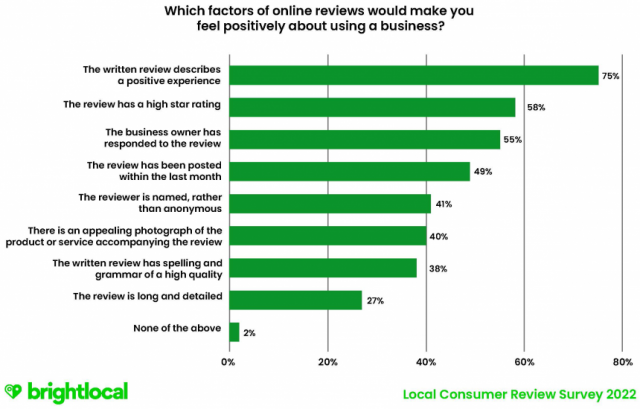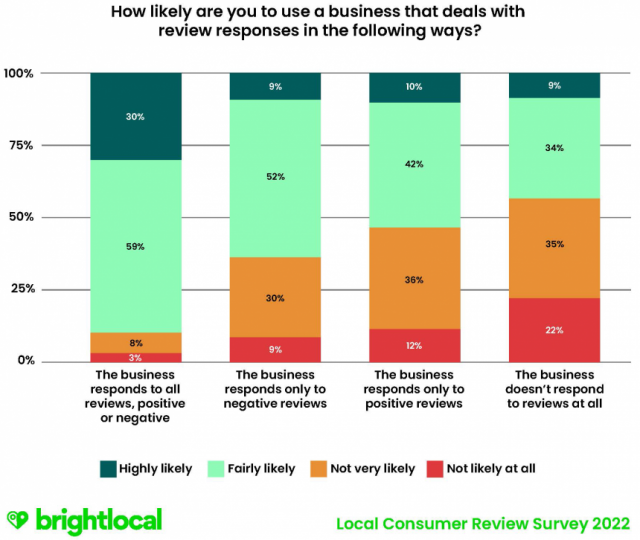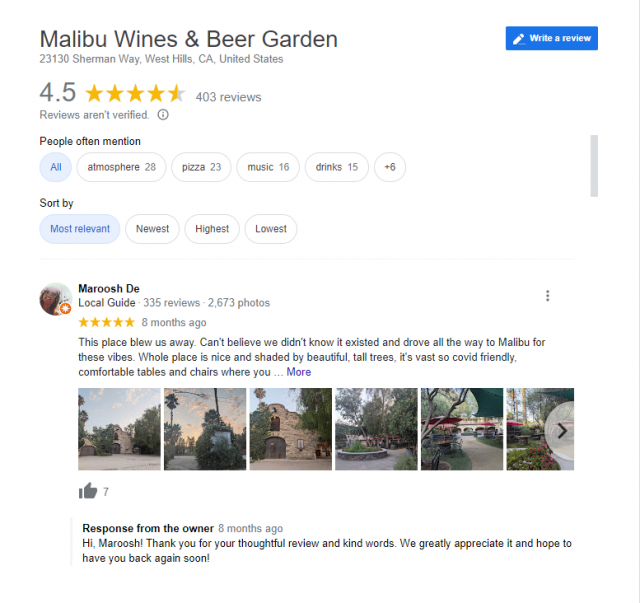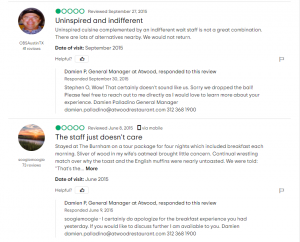
Responding to Online Reviews
Responding to both positive and negative reviews is part and parcel of reputation management, but did you know there are several business benefits to doing this?
Our latest consumer review research highlights the importance of responding to Google reviews, along with reviews on other platforms.
The Consumer Review Survey has revealed that 98% of consumers have read a local business review within the last year. Due to the design of many review platforms — including Google Reviews — each of those consumers could also have seen the business response to each of the reviews. This is valuable digital real estate that could be used to emphasize unique selling points (USPs), engage with consumers, and build closer relationships with those potential new and recurring customers or clients.
It’s hard to get your brand personality or the personable face of your customer service team across on a review site, so a review response provides a vehicle to do just that. You can use this space to bring your own brand voice to the site, which helps you to create a more authentic engagement with that customer.
Seeing a response from a business owner also matters to local consumers, with whether or not a business responds to a review being the third most important factor for local consumers. This is only behind the review sharing a positive experience and the business having a high star rating.

It’s clear from this data that consumers place a great deal of importance on businesses taking time to respond. This suggests that knowing how to respond to positive reviews can influence how favorably local consumers view your review profile.
There’s strong evidence to suggest that responding to reviews — both good and bad — can significantly increase your chances of winning new business, with 89% of consumers saying they’re either highly or fairly likely to choose a local business that responds to reviews. Not responding to reviews at all means consumers are very unlikely to use your business.

Does responding to reviews help with SEO?
Responding to reviews is a local search ranking factor, with timeliness of response and responding to positive and negative reviews both playing a role. Google has confirmed that managing and responding to reviews does impact local search visibility.
Many businesses are so focused on generating reviews, they forget to reply to the reviewer. Taking the time to respond is an easy way to add an additional layer of satisfaction to your customer service. Also, doing so can make a person more likely to use your business after they find you in the search results.
How do you thank someone for a positive review?
Responding to a positive review can be both quick and easy. Begin by thanking the reviewer for their feedback. Personalize your response by referencing something the reviewer particularly appreciated about your product or service and invite them to take an action, such as visiting you again soon. Keep your response short, be genuine, and respond in as timely a manner as possible.
How do you respond to a five-star review?
Replying to a five-star review is no different than replying to other positive reviews or those with three or four stars. Be timely in your response, thank the reviewer for sharing their experience, and be sure to modify your response to reflect a particular detail, such as a team member or feature that the reviewer enjoyed. Your response doesn’t need to be long or over the top — simply be authentic, appreciative, and concise.

Related: Free Online Video Course – ‘A Beginner’s Guide to Generating and Managing Reviews‘
The Five Steps of Responding to Google Reviews
Responding to reviews, both positive and negative, needs to be done in a timely manner to be effective and impactful.
1: Use a Tool
If you have a reputation management tool, you may be able to respond to the review directly from the dashboard. Use this if you have one available to you — it streamlines the process and makes it easier to keep track of which reviews you’ve responded to.
2: Be Proactive
If you don’t have a reputation management tool, build manual response management into your daily schedule. Set time aside each day after you monitor online reviews to respond to new comments. It’s advisable to respond to negative reviews first (even ones you suspect to be fake) in order to limit the damage and put the wheels in motion for dispute resolution.
3: Shape an Appropriate Response
Reviewers generally fall into a specific category. Identifying which type of reviewer you’re dealing with will help you formulate a plan of action for your response. You can use our ‘Types of Reviewer’ resource to help you do this.
4: Take Negative Reviews Offsite
Negative reviews are a fact of life for any local business. The key to dealing with them is having a honed response process. As a first step, encourage the reviewer to converse with you off the review site. Invite them to send you an email or to give you a call.
Once the issue is resolved, ask them to amend or update their review to reflect the steps taken to remedy the situation.

5: Develop a Range of Canned Responses
If you don’t have time to craft a unique response for every review, develop a stock of templated responses which you can mix and match. Be sure to vary elements to suit the original review, such as referencing a staff member they’ve mentioned, a location (if you have multiple locations), or a particular product, service, or business feature (such as outdoor dining). Our handy review response templates — with examples you can copy and paste — are a great starting point if you’re looking for help responding to positive reviews.